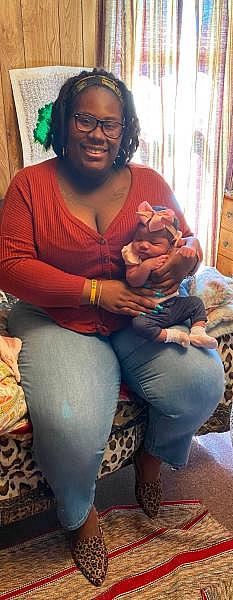A new baby for one family that grieved infant losses, but racial gap in deaths remains
This story was produced as part of a larger project for the 2019 National Fellowship, a program of USC Annenberg's Center for Health Journalism.
Other stories in this series include:
Saving the lives of black babies in Wake County is the goal of a new effort
Here’s what could help save more black infants’ lives. But NC isn’t doing it.
Too many black infants are dying. NC has an obvious step to take
Urban or rural, black lives in NC are being cut short almost before they begin
We know making informed decisions is important to you, that’s why we’re bringing you local and relevant information on candidates running for office across North Carolina. Fill out your custom ballot and find other essential election coverage in our voter guide.
Like many expectant mothers, Renee Schoolfield had worries and questions about her baby’s health. But her pregnancy was partly shadowed by her experiences in 2018, when she lost two children months apart shortly after they were born.
When her uncle died earlier this year, Schoolfield worried that grieving too hard would hurt the baby. She worried when she went to the bathroom about her water breaking, as it did with her first daughter.
“I prayed a lot,” she said. “I prayed more this year than ever. In the back of my mind, it was ‘What if this happens? ‘What if that happens?’”
Schoolfield, who lives in Ahoskie, was featured in a News & Observer article this year about Black babies being twice as likely as white babies to die before they reach their first birthdays.
Structural racism is at the foundation of the disparity, experts say.
Black babies die at higher rates than white babies no matter their mothers’ education level or age.
Arline Geronimus, a University of Michigan researcher, theorizes that chronic stress from racism and historic discrimination causes health problems, including preterm births, in Black Americans.
Renee Schoolfield’s daughter, Azlyn Briel, was born in September 2020. CONTRIBUTED
Schoolfield said that with this pregnancy, she had surgery to help prevent premature birth. COVID-19 restrictions meant she had to go into the hospital for the surgery by herself. “That was a little scary,” she said.
She quit her part-time job in March and worked from home at her full-time job.
She and fiance Domonique Moore celebrated the birth of their daughter, Azlyn Briel, last month. They call her Bae for Blessing After Everything. She will be four weeks old on Tuesday.
Moore was able to be in the hospital for the delivery, and he had skin-to-skin contact with their daughter in that first hour, Schoolfield said.
“I am blessed,” she said.
Renee Schoolfield stands with her infant daughter born in September 2020, Azlyn Briel, in front of the burial site for her two children who died after being born prematurely. CONTRIBUTED
North Carolina and the rest of the United States have been staring at a racial gap in infant survival for years. Complete information on infant deaths in North Carolina in 2019 and the first half of 2020 is not available, but what there is shows the gap persists.
In 2019, according to state Department of Health and Human Services statistics, 53.5% of the state’s babies were born to white mothers, and 24.4% were born to Black mothers. In the first nine months of 2019, 199 white babies died in infancy, while 258 Black babies did not live to see their first birthdays, according to provisional data.
In the first half of 2020, 52.7% of babies were born to white mothers, and 24.6% had Black mothers. In those same months, 44.6% of the babies who did not live to their first birthdays were Black, and 31.7% were white, according to provisional data.
The overall infant mortality rate in 2018, the most recent year available, was 6.7 deaths per 1,000 births in North Carolina, according to the CDC, higher than the national average of 5.7 deaths per 1,000 births.
In 2016, DHHS developed a plan to improve infant and maternal health and reduce the racial gap in infant death rates. An NC Institute of Medicine task force this year published recommendations for improving health care for women before and after childbirth.
A state Maternal Health Task Force, which the Institute of Medicine has organized, started meeting this year as part of a federal grant worth $2 million a year over five years to develop and promote practices that will improve the health of women, and by connection, their children.
Task force members are focusing on family planning, labor, health during pregnancy and postpartum care, said James Coleman, the research specialist at the Institute of Medicine who coordinates the task force work. The group is also talking about ways to get more specialists in women’s health care in eastern and western counties, he said.
The task force recommendations are intended to help all North Carolinians, said Michelle Ries, the Institute of Medicine’s interim director. It is also identifying ways to address the racial disparities in maternal and infant health, she said.
The task force includes women who had serious health problems, and those whose children had health problems or died, who have spoken about ways they could have been cared for differently, Ries said. Doulas who work with women of color are also on the task force, she said.
Tina Sherman, a campaign director for MomsRising and a member of the task force, said having the multitude of groups and people interested in maternal and infant health working together to share ideas and develop strategies is important.
“Getting their buy-in is key to pulling everyone together and really seeing movement,” she said.
“One of the things I’m really proud of in this state, we take a while to get there sometimes, but when we do it, we do it right.”
[This story was originally published by The News & Observer.]
